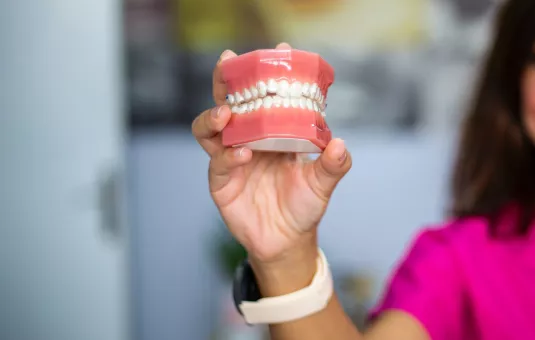
When you’re caught up in the spirit of the season, it can be easy to forget about things like your oral health. But this is the time of year when your teeth and gums need the most care, especially if you’re indulging your sweet tooth.
Nothing spoils the festive mood like a toothache, and if you let your oral care routine slide over the holidays, tooth decay can quickly develop into gum disease.
Not only is gum disease painful and the leading cause of tooth loss among adults, it’s also a major cause of bad breath – which could be bad news if you’re hoping for a kiss under the mistletoe.
What is gum disease?
Like tooth decay, gum disease (also called periodontal disease) is caused by the spread of dental plaque. When plaque reaches your gums, it can cause them to swell, redden and even bleed – the common symptoms of gingivitis.
If gingivitis isn’t treated, it will develop into more serious periodontitis. The gums start to recede and the tooth roots and jaw bone break down, causing teeth to loosen and fall out.
Why is gum disease common over the holidays?
The bacteria in plaque thrive on sugar, so the high sugar content of many festive foods and drinks put you at greater risk of developing oral health problems over the holiday season.
Combine this with busy schedules and a break from the routine meaning that many people neglect to brush and floss as often as they should, and you have the perfect ingredients for gum disease.
Can gum disease be prevented?
The good news is, gum disease is completely preventable if you follow good oral hygiene. This means:
- brush your teeth at least twice a day using a fluoride toothpaste
- brush for at least two minutes and replace your toothbrush every few months
- floss every day to remove food and plaque from hard-to-reach areas
- try to avoid sugary and starchy food and drink as much as possible.
Not all festive food is bad for your teeth and gums. Make sure your turkey roast is accompanied by lots of fresh veggies for a vitamin boost and add cranberries to prevent bacteria from sticking to your teeth and gums.
If you think you’ll be consuming a lot of sugar over Christmas and New Year, you should add a fluoride mouthwash to your daily oral care routine for extra protection against plaque.
How is gum disease treated?
Even if you do spot the signs of gingivitis, this condition is usually easy to reverse – as long as you catch it early.
Getting back into good oral hygiene habits and rinsing your mouth with an antiseptic mouthwash may be enough to return your gums to normal, but you should still see your dentist for a complete oral examination and cleaning.
If your gingivitis has already progressed into periodontitis, it may require invasive surgery. Gum disease treatment can involve removing plaque deposits from inside the gums, replacing soft and hard tissues, and placing dental implants if the tooth roots have been damaged beyond repair.
To find out more about gum disease treatment or to make an appointment in Perth’s Northern suburbs, get in touch with Ocean Reef Dental Surgery. Call our clinic on (08) 9307 6700.

